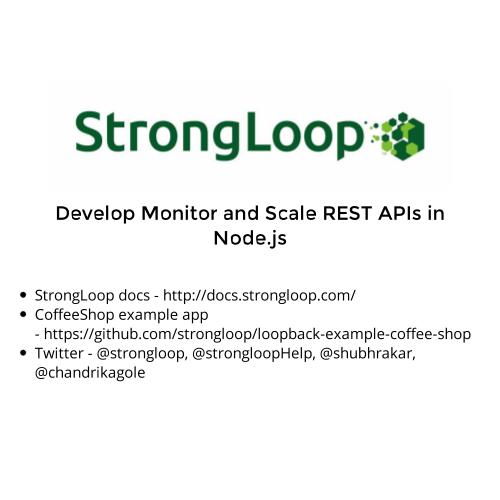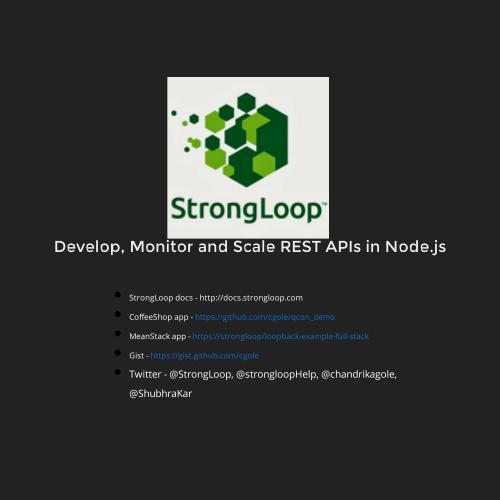Develop, Monitor and Scale REST APIs in Node.js

- StrongLoop docs - http://docs.strongloop.com
- CoffeeShop app - https://github.com/cgole/qcon_demo
- MeanStack app - https://strongloop/loopback-example-full-stack
- Gist - https://gist.github.com/cgole
- Twitter - @StrongLoop, @strongloopHelp, @chandrikagole, @ShubhraKar,

Prerequisites
- Node( version 0.10.33) - http://nodejs.org/download/
- Python( version 2.7.8)
-
Mongodb
- Start mongo
-
Connect to mongo with mongo shell
- $ mongo
-
Git (Full install)
-
For Windows - Microsoft Visual Studio C++ 2012 for Windows Desktop (Express version works well)
-
For Mac - XCode
-
strongloop cli -> $ npm install -g strongloop

The Frontend is changing fast (Mobile First !)


And it isn’t done yet !









APIs are powering this change
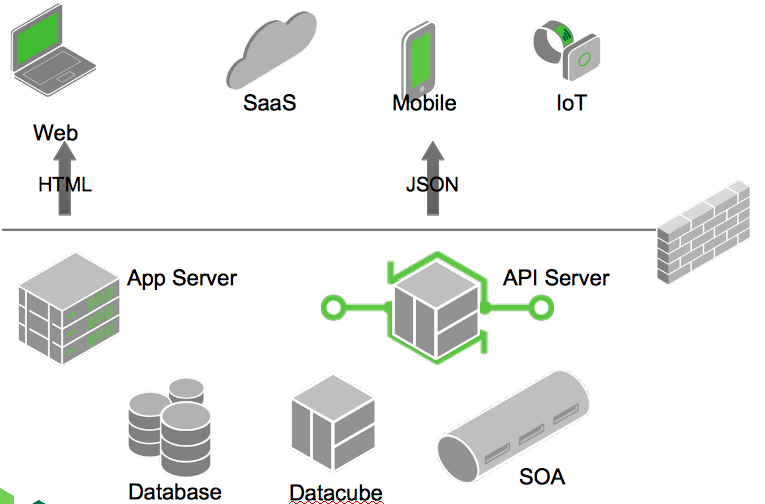

OK... But how do I cross the legacy bridge?
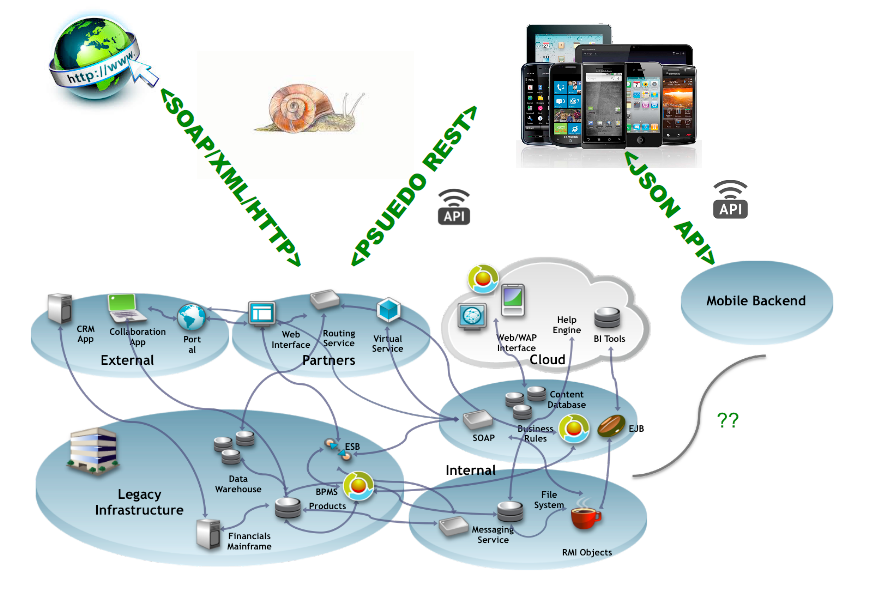

Distinctly unique approaches to solve the same problem
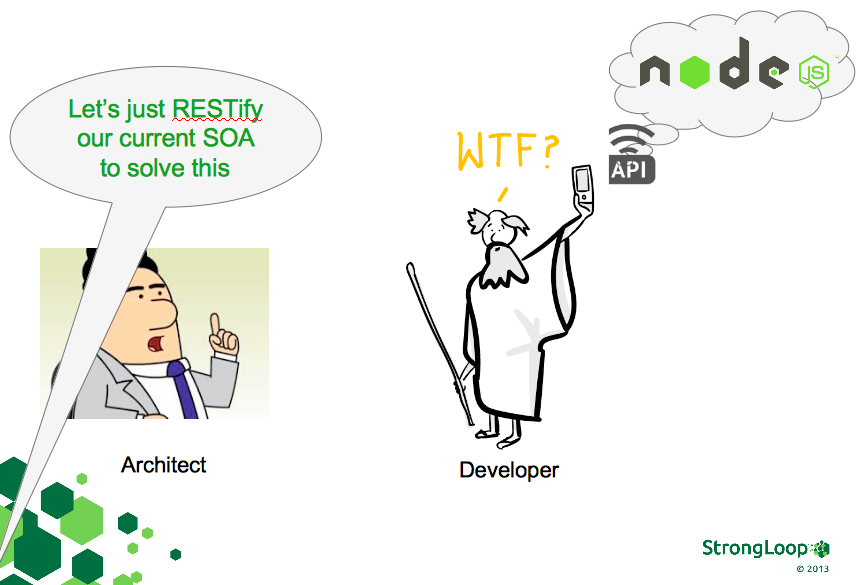

What backend is being used for APIs ?
Node is FAST
.. and highly concurrent
Node is perfect for APIs
Node powers full-stack JS



What is Node.js?
Asynchronous, event-driven, non-blocking I/O platform that is perfect for real-time, data-intensive applications.
Single thread of execution
Built on Chrome’s JavaScript runtime engine, V8
Uses Libuv, a high performance evented I/O library that works on Linux and Windows (faster than Libev)
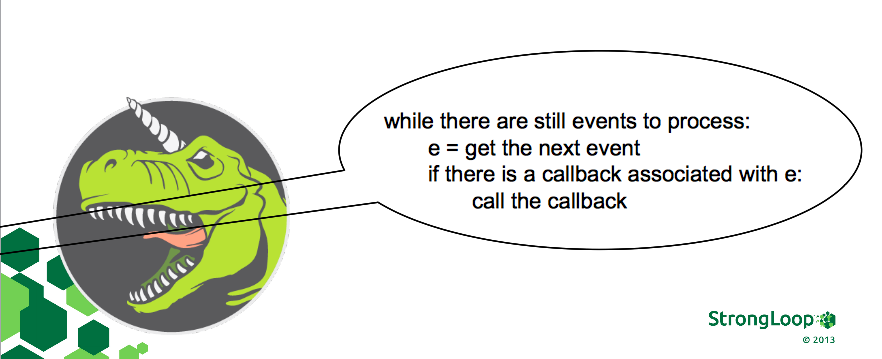

Threads Don’t Wait !



Behind the curtain
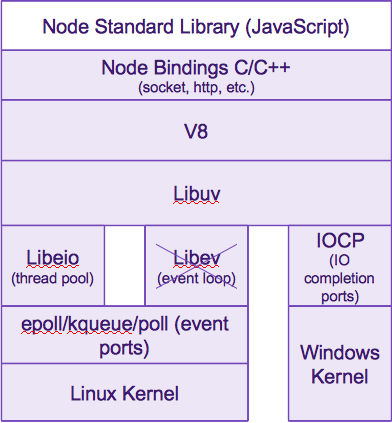

Yes, it's C back there

But what exactly is full stack



Full Stack JavaScript is powering mobility
A Compelling Option for Enterprise Mobility
- Faster time to market vs. 100% native development
- Reuse skills of existing web developer staff
- Open Source stack / no vendor lock-in
- For Enterprise apps, performance is comparable to native apps
- Near “write once, run anywhere” UI: tablets, phones, smart TVs, smart watches, cars, etc.
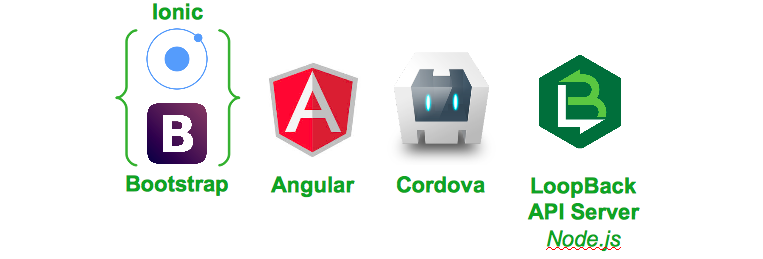
Gartner predicts by 2016 more than 50% of the apps deployed will be Hybrid apps.

But is the backend really being written in JS ?
- Node.js active contributors (>65K)
- Very large and active developer community
- Growing/ most modules (100K > Java, Ruby, PHP... )


Popular Frameworks



Express

var express = require('express');
var Item = require('models').Item;
var app = express();
var itemRoute = express.Router();
itemRoute.param('itemId', function(req, res, next, id) {
Item.findById(req.params.itemId, function(err, item) {
req.item = item;
next();
});
});
itemRoute.route('/:itemId')
.get(function(req, res, next) {
res.json(req.item);
})
.put(function(req, res, next) {
req.item.set(req.body);
req.item.save(function(err, item) {
res.json(item);
});
})
.post(function(req, res, next) {
var item = new Item(req.body);
item.save(function(err, item) {
res.json(item);
});
})
.delete(function(req, res, next) {
req.item.remove(function(err) {
res.json({});
});
})
;
app.use('/api/items', itemRoute);
app.listen(8080);
Sample code (Router using express 4.x)

-
Pros
-
Little learning curve, Express is nearly a standard for Node.js web application
-
Fully customizable
-
-
Cons
-
All end points need to be created manually, you end up doing a lot of the same code (or worse, start rolling your own libraries after a while)
-
Every end point needs to be tested (or at the very least I recommend that you hit the end points with HTTP consumer to make sure they are actually there and don’t throw 500s)
-
Refactoring becomes painful because everything needs to be updated everywhere
-
Doesn’t come with anything “standard”, have to figure out your own approach
-

RESTful APIs with Restify

var restify = require('restify');
var Item = require('models').Item;
var app = restify.createServer()
app.use(function(req, res, next) {
if (req.params.itemId) {
Item.findById(req.params.itemId, function(err, item) {
req.item = item;
next();
});
}
else {
next();
}
});
app.get('/api/items/:itemId', function(req, res, next) {
res.send(200, req.item);
});
app.put('/api/items/:itemId', function(req, res, next) {
req.item.set(req.body);
req.item.save(function(err, item) {
res.send(204, item);
});
});
app.post('/api/items/:itemId', function(req, res, next) {
var item = new Item(req.body);
item.save(function(err, item) {
res.send(201, item);
});
});
app.delete('/api/items/:itemId', function(req, res, next) {
req.item.remove(function(err) {
res.send(204, {});
});
});
app.listen(8080);Sample Code (Router using restify)

-
Pros
Automatic DTrace support for all your handlers (if you’re running on a platform that supports DTrace)
Doesn’t have unnecessary functionality like templating and rendering
Built in throttling
Built in SPDY support
-
Cons



var Hapi = require('hapi');
var Item = require('models').Item;
var server = Hapi.createServer('0.0.0.0', 8080);
server.ext('onPreHandler', function(req, next) {
if (req.params.itemId) {
Item.findById(req.params.itemId, function(err, item) {
req.item = item;
next();
});
}
else {
next();
}
});
server.route([
{
path: '/api/items/{itemId}',
method: 'GET',
config: {
handler: function(req, reply) {
reply(req.item);
}
}
},
{
path: '/api/items',
method: 'PUT',
config: {
handler: function(req, reply) {
req.item.set(req.body);
req.item.save(function(err, item) {
reply(item).code(204);
});
}
}
},
{
path: '/api/items',
method: 'POST',
config: {
handler: function(req, reply) {
var item = new Item(req.body);
item.save(function(err, item) {
reply(item).code(201);
});
}
}
},
{
path: '/api/items/{itemId}',
method: 'DELETE',
config: {
handler: function(req, reply) {
req.item.remove(function(err) {
reply({}).code(204);
});
}
}
}
]);
server.start();Sample Code (Router using hapi)




Sample Code (Router using Loopback)

Sample Code (Router using Loopback)
Code needed
var loopback = require('loopback');
var Item = require('./models').Item;
var app = module.exports = loopback();
app.model(Item);
app.use('/api', loopback.rest());
app.listen(8080);Endpoint automatically needed
DELETE /items/{id}
GET /items
GET /items/count
GET /items/findOne
GET /items/{id}
GET /items/{id}/exists
POST /items
PUT /items
PUT /items/{id}
Sample Code (API explorer and test)
Code needed
var explorer = require('loopback-explorer');
app.use('/explorer', explorer(app, {basePath: '/api'}));API explorer automatically created


Code needed
var loopback = require('loopback');
var explorer = require('loopback-explorer');
var remoting = require('strong-remoting');
var Item = require('./models').Item;
var app = module.exports = loopback();
var rpc = remoting.create();
function echo(ping, callback) {
callback(null, ping);
}
echo.shared = true;
echo.accepts = {arg: 'ping'};
echo.returns = {arg: 'echo'};
rpc.exports.system = {
echo: echo
};
app.model(Item);
app.use('/api', loopback.rest());
app.use('/explorer', explorer(app, {basePath: '/api'}));
app.use('/rpc', rpc.handler('rest'));
app.listen(8080);Remotable calls
$ curl "http://localhost:8080/rpc/system/echo?ping=hello"
{
"echo": "hello"
}
-
Pros
-
Very quick RESTful API development
-
Convention over configuration
-
Built in models ready to use
-
RPC support
-
Fully configurable when needed
-
Extensive documentation
-
Fulltime team working on the project
-
Available commercial support
-
-
Cons
-
Learning curve can be pretty steep because there are so many moving parts
-

LoopBack Studio

-
Visual ORM
-
Discovery
-
Migration
-
DEV - API Design & Composition
-
OPS – Provisioning, Scaling & Monitoring
A visual tool for creating and managing Node.js powered REST APIs

API Design & Composition
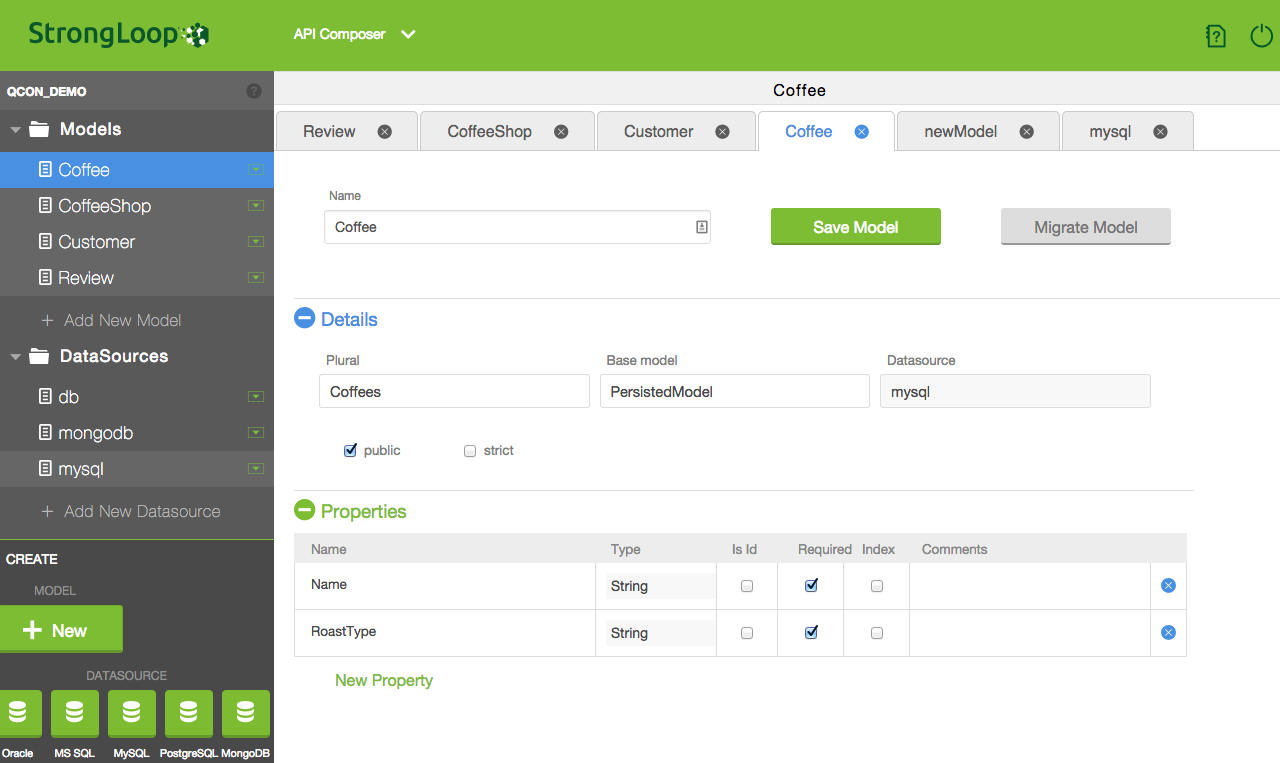

Migration
mysql> use coffee;
Database changed
mysql> show tables;
+------------------+
| Tables_in_coffee |
+------------------+
| Coffee |
+------------------+
1 row in set (0.15 sec)
mysql> describe Coffee;
+-----------+--------------+------+-----+---------+----------------+
| Field | Type | Null | Key | Default | Extra |
+-----------+--------------+------+-----+---------+----------------+
| id | int(11) | NO | PRI | NULL | auto_increment |
| Name | varchar(512) | YES | | NULL | |
| RoastType | varchar(512) | YES | | NULL | |
+-----------+--------------+------+-----+---------+----------------+
3 rows in set (0.07 sec)

Discovery


Profiling using studio
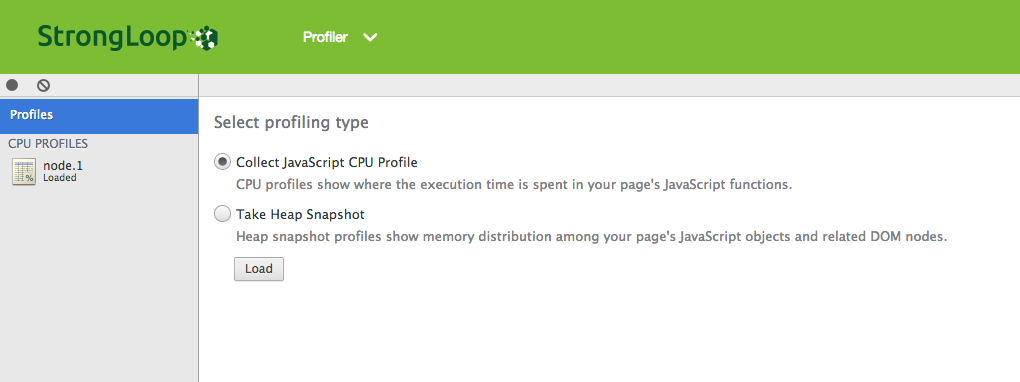
**Use the loadtest.js script to generate load

Monitoring - On-premises and Hosted

Register and get license key at http://strongloop.com

Supported metrics backends are:
- `statsd://[<host>][:<port>][/<scope>]`
- `graphite://[<host>][:<port>]`
- `syslog:[?[application=<application>][,priority=<priority>]` (syslog is the
Unix logging framework, it doesn't exist on Windows)
- `splunk://[<host>]:<port>`
- `log:[<file>]`
- `debug:[?pretty[=<true|false>]]`

Object Tracking
$ slc run --cluster cpus -d$ slc runctl objects-start <pid>Start a cluster
Start object tracking

Start CPU profiling
$ slc runctl cpu-start <pid>
Stop CPU profiling
$ slc runctl cpu-start <pid>
-
Open .cpuprofile files with Chrome Developer Tools for viewing and analysis.

$ slc runctl heap-snapshot <pid>Take a heap snapshot
-
Open .cpuprofile files with Chrome Developer Tools for viewing and analysis.

Hosted monitoring

Title Text
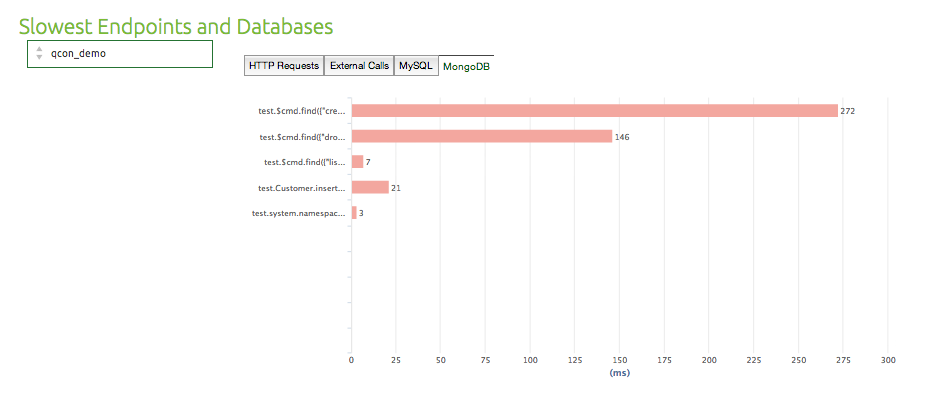
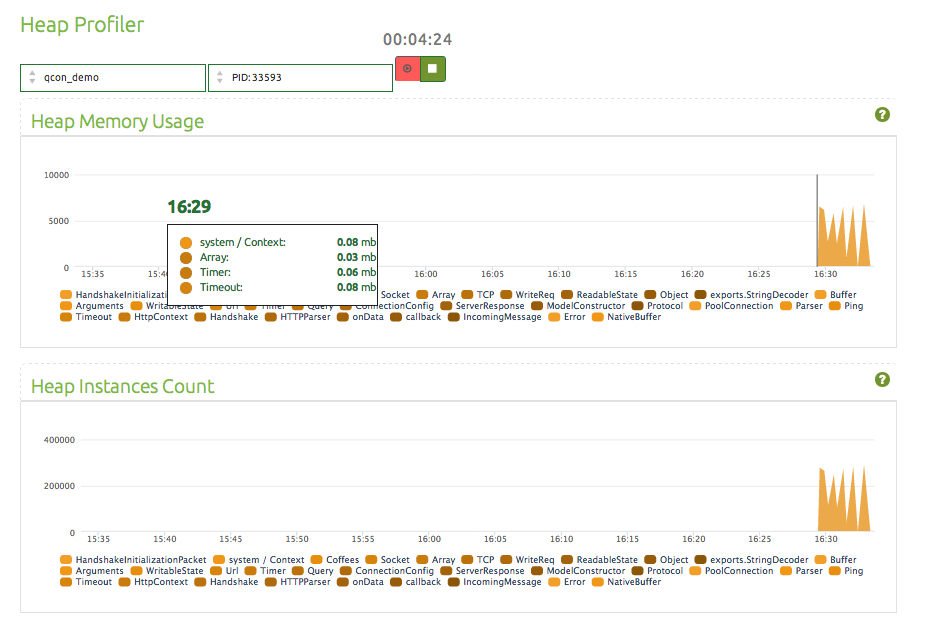


Loopback - An Open-source Node.js Framework


Develop APIs from scratch with the open source Loopback.io framework.
-
Middleware API Engine
-
ORM
-
Aggregation & Mashups
-
API Explorer (Swagger)
-
Fine Grained Access Control (ACLs)
-
Data Replication
-
IsoMorphic JS and Client SDKs.



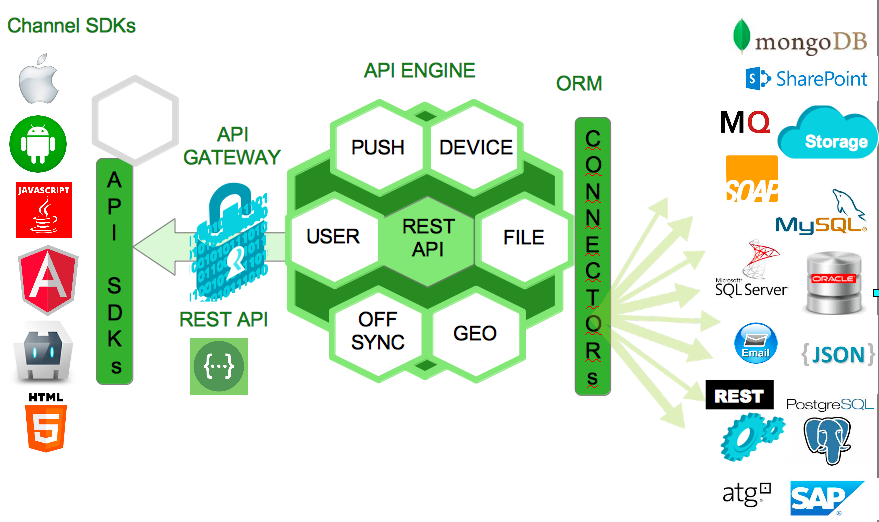

Create new app
$ slc loopback
_-----_
| | .--------------------------.
|--(o)--| | Let's create a LoopBack |
`---------´ | application! |
( _´U`_ ) '--------------------------'
/___A___\
| ~ |
__'.___.'__
´ ` |° ´ Y `
[?] Enter a directory name where to create the project: (.) 
Connect an API to a datasource
$ cd myproject
$ slc loopback:datasourceInstall the connector
$ npm install loopback-connector-mongodb --save
Create models
$ slc loopback:model
API Explorer and FrontEnd App Integration
$ slc run
Browse your REST API at http://localhost:3000/explorer
Web server listening at: http://localhost:3000/
API Explorer
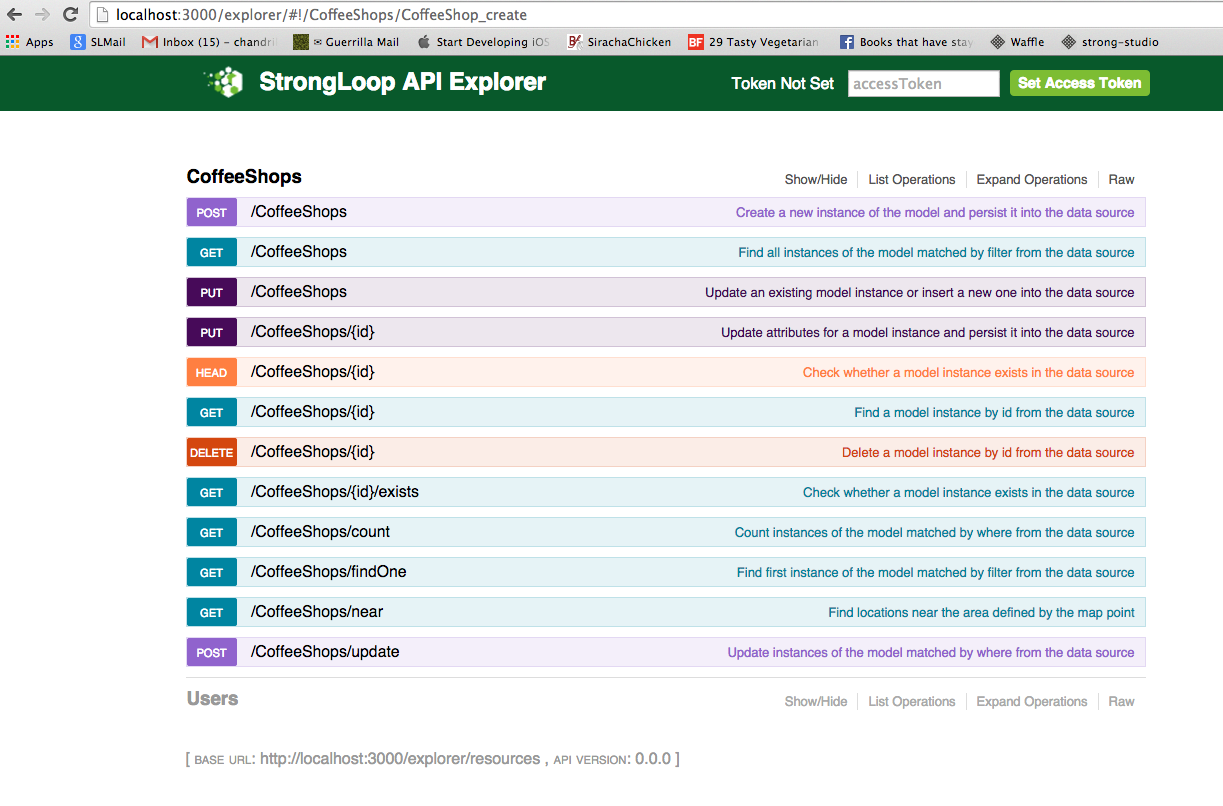

Query your data using the mongo CLI
> use test
switched to db test
> show collections;
CoffeeShop
system.indexes
> db.CoffeeShop.find().limit(4)
{ "Name" : "Aesop's Tables", "pos" : { "lat" : 37.5332, "lng" : -85.7302 }, "_id" : ObjectId("543f0787f9fed2bb759fc146") }
{ "Name" : "Award Winners Cafe", "pos" : { "lat" : 41.3896, "lng" : -88.12595 }, "_id" : ObjectId("543f0787f9fed2bb759fc147") }
{ "Name" : "Acadia Cafe", "pos" : { "lat" : 44.454, "lng" : -68.04902 }, "_id" : ObjectId("543f0787f9fed2bb759fc148") }
{ "Name" : "Adams Coffee Shop", "pos" : { "lat" : 42.25639, "lng" : -71.01119 }, "_id" : ObjectId("543f0787f9fed2bb759fc149") }
> 
Model Relations
$ slc loopback:relationCustomer - hasMany Review
- property name for the relation: reviews
- custom foreign key: authorId
CoffeeShop - hasMany Review
- property name for the relation: reviews
- custom foreign key: coffeeshop
Review - belongsTo Customer
- property name for the relation: author
- custom foreign key: authorId
Review - belongsTo CoffeeShop
- property name for the relation: coffeeshop
- custom foreign key: coffeeshop

Fine Grained Access Control (ACLs)
$ slc loopback:acl
[?] Select the model to apply the ACL entry to: CoffeeShop
[?] Select the ACL scope: All methods and properties
[?] Select the access type: All (match all types)
[?] Select the role: Any unauthenticated user
[?] Select the permission to apply: Explicitly deny access
getIndexes()
StrongLoop Controller


-
OSS Controller
-
Cluster Mgmt.
-
Hot Deploy
-
Rolling Restart
-
Cluster State Mgmt.
-
Process Mgmt.
-
Deploy

Debugging
Run your app in the debugger
$ slc debug
Build and package the application
$ rm -rf node_modules // Shouldnt commit node_modules into master branch
$ git init .
$ git commit -a -m "Initial commit"
$ slc build --onto deploy --install --commit
Run StrongLoop Process Manager server
$ slc pm -l 7777Deploy to Process Manager Server
$ slc deploy http://localhost:7777 deploy 
Scale and Control an application cluster
Run an application cluster
$ slc run --cluster=cpusControl the cluster using slc runctl
-
View cluster status
-
Change cluster size
-
Restart worker processes
-
Stop c

Manage application logs
$ slc run --cluster cpus --log getstarted.%w.log
Open Source mBaaS (mobile Backend as a Service)


Push Notification




GeoLocation

CoffeeShop.attachTo(oracle);
var here = new GeoPoint({lat: 10.32424, lng: 5.84978});
CoffeeShop.find( {where: {location: {near: here}}, limit:3}, function(err, nearbyShops) {
console.info(nearbyShops); // [CoffeeShop, ...]
});


Storage Service



Offline Sync


Thank you!

StrongLoop - APIs in minutes with Node.js
By chandrikagole
StrongLoop - APIs in minutes with Node.js
- 1,735

